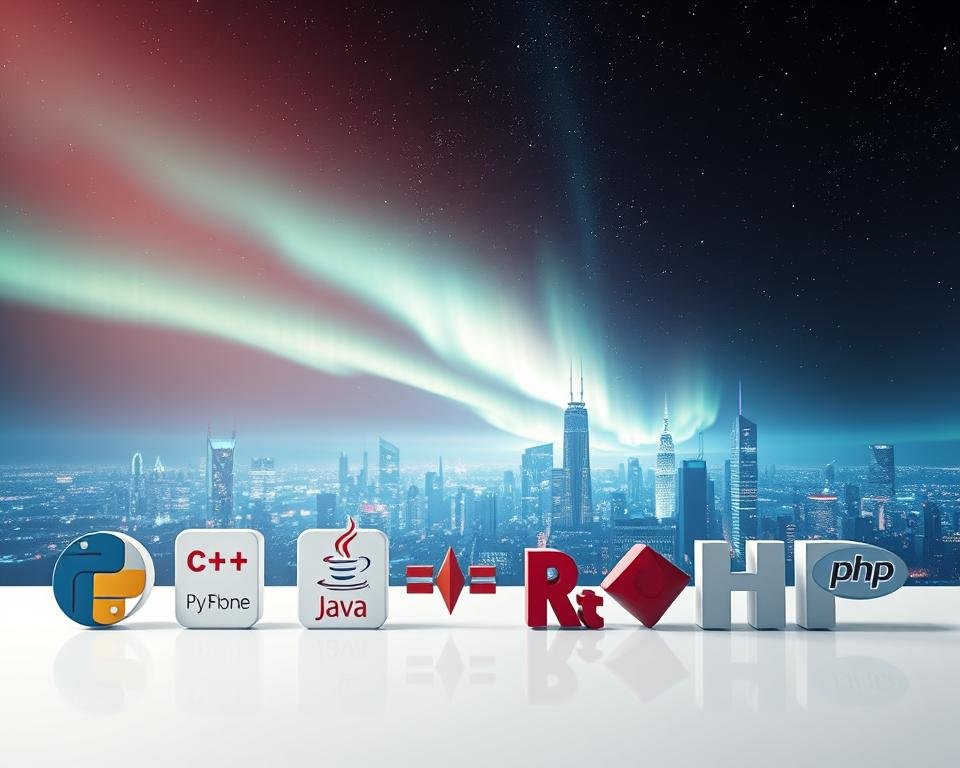As I explore the world of coding, I see some techniques are key for being good at it.
Knowing these coding techniques is important. They help you write clean, efficient, and effective code. This is true for both new and experienced coders.
In this article, I will share the essential techniques. They can improve your skills and give a full view of coding.
Key Takeaways
- Mastering fundamental coding techniques is vital for any programmer.
- Understanding popular coding languages is essential for staying relevant.
- Version control and debugging are critical skills for efficient coding.
- Algorithms play a significant role in writing effective code.
- Staying up-to-date with the latest coding trends is important.
Understanding the Basics of Coding
Coding, or computer programming, is key in today’s tech world. It’s not just good to know; it’s essential for anyone in tech.
So, what is coding? It’s about designing, writing, testing, and keeping computer programs running. You need to know programming languages and how to solve tough problems.
What is Coding?
Coding lets us talk to computers and make digital stuff. This includes websites and AI systems. It’s a mix of logic, creativity, and solving problems.
The coding process has several steps. You plan, write code, test, and fix bugs. Each step is important for a working product.
Why Learn Coding?
Learning to code opens many doors. There’s a big need for programmers today. It leads to jobs in software, data, and AI.
Coding also boosts your problem-solving and creativity. It’s useful in many fields, making you a valuable worker.
Key benefits of learning to code include:
- Improved job prospects
- Enhanced problem-solving skills
- Creativity and innovation
- The ability to build digital products
Common Myths About Coding
There are myths about coding that might stop you from trying. One is that you must be good at math. But math isn’t needed to start coding.
Another myth is coding is only for the young. But you can learn coding at any age. Many programmers started later in life.
Knowing the basics of coding and clearing up these myths can start your tech career.
Popular Coding Languages for Beginners
There are many coding languages out there. It’s important to find the right ones for beginners. Learning the right language can greatly help your coding journey.
Python: An Introductory Favorite
Python is seen as a top choice for beginners. It’s easy to learn and read. Python’s syntax is designed to be easy to understand, with a focus on readability. This makes it great for those new to coding.
Python is also used in many areas like web development and data analysis. Its wide range of libraries and frameworks make it popular among developers.

JavaScript: The Web’s Backbone
JavaScript is key for web development. It makes web pages interactive and dynamic. JavaScript’s versatility and compatibility with various browsers make it a valuable skill to have.
Learning JavaScript can lead to jobs in web development and more. Its widespread use makes it a great language for beginners.
HTML & CSS: Building Blocks of the Internet
HTML and CSS are the basics of the internet. They help structure and style web pages. Understanding HTML and CSS is essential for anyone looking to build a career in web development.
HTML creates the structure and content of web pages. CSS controls the layout and look. Together, they are key for web development, making them important for beginners.
Version Control with Git
Version control is key in coding, and Git is a top choice. It’s vital for managing code changes and team work.
Git tracks code changes, letting many developers work on a project together. It’s loved for its flexibility and strong features.
What is Git?
Git is free and open-source, great for all project sizes. It’s a distributed system, so many can work on a project at once. No need for a central server.
Benefits of Using Git
Git has many advantages, like:
- Version tracking: It keeps track of code changes over time.
- Collaboration: Many developers can work on a project together smoothly.
- Branching and merging: You can create new branches for features or bug fixes. Then, merge them back into the main code.
Basic Git Commands Everyone Should Know
To start with Git, learning basic commands is key. Here are a few:
| Command | Description |
|---|---|
| git init | Start a new Git repository |
| git add . | Stage all changes in the current directory |
| git commit -m “message” | Commit changes with a meaningful message |
| git push | Push committed changes to a remote repository |
| git pull | Pull changes from a remote repository |
Knowing these basic Git commands will boost your coding skills. It’s super helpful for coding tutorials and team projects.
Debugging Techniques for Clean Code
Debugging is as key as coding. It’s about finding and fixing errors in your code. There are many tools and methods to help with this.

Common Debugging Tools
Many tools can help find and fix code errors. Some top ones are:
- Print statements: Great for seeing how your code flows and what values variables have.
- Debuggers: Tools like Chrome DevTools or Visual Studio Debugger let you go through your code step by step.
- Log files: Looking at log files can show you what’s happening in your app.
Step-by-Step Debugging Process
Here’s how to debug step by step:
- Reproduce the error: Make sure you can always make the problem happen.
- Isolate the problem: Use tools to find where the error is.
- Analyze the data: Check variable values, log files, or other data to see what’s wrong.
- Fix the issue: Once you know the problem, change your code to fix it.
- Test your fix: Check if your changes solved the problem.
Tips for Efficient Debugging
To debug well, remember these tips:
- Stay calm and methodical: Debugging can be tough, but you need to be systematic.
- Use version control: Tools like Git help you keep track of changes and go back if needed.
- Test in isolation: Focus on the part of your code that’s causing the problem to debug better.
Learning these debugging techniques can make your code better and save you time. Good debugging skills are as important as coding skills, making you a better developer.
| Debugging Technique | Description | Benefits |
|---|---|---|
| Print Statements | Using print statements to understand code flow and variable values. | Easy to implement, helps understand code execution. |
| Debuggers | Tools that allow stepping through code line by line. | Provides detailed insights, helps identify complex issues. |
| Log Files | Analyzing log files to understand application behavior. | Helps in understanding application flow, identifies issues. |
Introduction to Algorithms and Data Structures
To write efficient code, you need to know about algorithms and data structures. These are key for any coder wanting to get better.
Algorithms are instructions to solve problems or do tasks. They help make code efficient and growable. Data structures organize and store data, making it easier to use.
Key Concepts in Algorithms
Algorithms can be simple or complex. Knowing how to create and use them is important. Types include sorting, searching, and graph algorithms.
Common Data Structures are arrays, linked lists, stacks, and queues. Each has its own benefits and drawbacks. Picking the right one is key for good coding.

Common Data Structures
Here are some often-used data structures:
- Arrays: A group of the same type of elements in memory.
- Linked Lists: A dynamic group of elements, each linked to the next.
- Stacks: A LIFO data structure, where elements are added and removed from the top.
- Queues: A FIFO data structure, where elements are added to the end and removed from the front.
Importance of Learning Algorithms
Learning algorithms is key for writing better code. It helps coders solve problems and handle tough challenges.
| Data Structure | Advantages | Disadvantages |
|---|---|---|
| Arrays | Fast access and modification | Fixed size, slow insertion/deletion |
| Linked Lists | Dynamic size, efficient insertion/deletion | Slow access and modification |
| Stacks | Simple implementation, efficient LIFO operations | Limited access to elements |
| Queues | Efficient FIFO operations | Limited access to elements |
In conclusion, knowing algorithms and data structures is vital for coders. It helps them improve their skills and write better code.
Best Practices for Writing Clean Code
As a developer, I’ve learned that clean code is just as important as functional code. Clean code makes projects easier to work on and maintain. It’s simpler to understand and fix.
Readability is a key part of clean code. When code is easy to read, it’s simpler to get what it does. To make code readable, follow some important guidelines.
Code Readability and Maintenance
Code that’s easy to read is easier to maintain. To make code readable, use simple names for variables. Avoid complicated structures and make sure your code is well-indented.
Here’s an example of how good formatting makes code easier to read:
| Poor Formatting | Good Formatting |
|---|---|
| if (condition) { doSomething(); } | if (condition) { doSomething(); } |
Good formatting makes code easier for everyone to understand. It helps both you and others get what the code does.
Commenting Your Code Effectively
Commenting your code is also key. Comments should explain why the code is there, not just what it does. Good comments give context without being too long.
- Explain complex parts or algorithms.
- Point out any issues or things to do.
- Avoid saying things that are obvious.
Good commenting makes your code easy to understand and keep up. It helps others and you get what the code does.
Naming Conventions and Consistency
Naming conventions are important for code readability. Using the same naming style helps everyone understand the code better. For example, using camelCase or underscore notation everywhere helps a lot.

In short, writing clean code means following some best practices. These include making code easy to read, comment well, and use consistent naming. By doing these things, developers can improve their coding skills. This makes codebases better and more efficient.
The Importance of Testing in Coding
In my experience with computer programming, testing is key. It makes sure the code works right and is reliable. Testing is more than finding bugs; it’s about making sure the software works as it should.
There are many types of testing, each with its own purpose. Knowing these types helps create a solid testing plan.
Different Types of Testing
Testing includes unit testing, integration testing, and system testing. Unit testing checks if individual code units work as they should. Integration testing looks at how these units work together. System testing checks the whole system.
| Type of Testing | Description | Benefits |
|---|---|---|
| Unit Testing | Verifies individual units of code | Early detection of bugs, easier maintenance |
| Integration Testing | Checks interaction between units | Ensures compatibility, reduces integration issues |
| System Testing | Evaluates the entire system | Validates overall functionality, performance |
Writing Unit Tests
Writing unit tests is a vital skill for developers. It means creating test cases for different scenarios. A good unit test is independent, repeatable, and self-validating. It’s important to keep unit tests simple and focused on one thing at a time.

Automated Testing Tools
Automated testing tools make testing easier. They run tests automatically, saving time and reducing mistakes. Tools like Selenium for web apps and JUnit for Java are popular.
By adding testing to your coding workflow, you make your code better. Testing is key, whether you’re working on a small or big project.
Resources for Learning Coding
Improving coding skills starts with the right resources. Quality tutorials and materials make a big difference. I know this from personal experience.
Let’s look at some top resources for learning to code. You’ll find online courses, books, and communities. They offer support and guidance on your coding path.
Online Courses and Platforms
Online courses are great for learning coding. They offer structured lessons and tutorials. Here are some popular ones:
- Coursera: Offers courses from top universities.
- Udemy: Has many courses on coding topics.
- Codecademy: Focuses on interactive coding lessons.
These platforms have coding tutorials for all learning styles and levels.

Recommended Coding Books
Coding books are also valuable. They provide deep knowledge and explanations. Here are some top picks:
| Book Title | Author | Focus Area |
|---|---|---|
| Clean Code | Robert C. Martin | Best practices for writing clean code |
| Introduction to Algorithms | Thomas H. Cormen | Algorithms and data structures |
| HTML and CSS: Design and Build Websites | Jon Duckett | Web development basics |
Coding Communities and Forums
Joining coding communities and forums is helpful. They offer support and networking. Here are some notable ones:
- GitHub: A platform for version control and collaboration.
- Stack Overflow: A Q&A forum for programmers.
- Reddit’s r/learnprogramming: A community for discussing programming and learning resources.
These communities are great for asking questions, sharing knowledge, and learning from others.
Building Projects to Enhance Skills
Working on real-world projects is a great way to get better at coding. It helps you understand coding better and gives you practical experience. This experience is very valuable in the tech world.
Start with simple projects to build your confidence. As you get better, you can take on harder tasks. You can even contribute to open-source projects and show your work online.
Start with Simple Projects
Begin with simple projects to apply what you’ve learned. For example, you can make a personal website using HTML, CSS, and JavaScript. This shows how different coding languages work together.
- Make a to-do list app to practice with databases and user interfaces.
- Create a simple game like Tic-Tac-Toe to learn about game logic and state management.
- Build a weather app to understand APIs and data fetching.
These projects are fun and build a strong foundation in coding. As you finish them, you’ll feel more confident and ready for harder projects.

Contribute to Open Source
Working on open-source projects is a big step in your coding journey. It lets you work with other developers, learn from them, and improve your skills a lot.
To start with open-source, follow these steps:
- Find a project on GitHub or another platform that interests you and fits your skill level.
- Read the project’s documentation and understand its contribution guidelines.
- Start with small contributions, such as fixing bugs or improving documentation.
- Engage with the community by participating in discussions and submitting pull requests.
Working on open-source projects boosts your coding skills and helps you build a reputation in the developer community.
Showcase Your Work Online
It’s important to show your projects online to attract employers. GitHub and personal websites are great for this.
When showing your projects, remember these tips:
- Document your projects well, including the technologies used and challenges faced.
- Use version control systems like Git to manage your projects and track changes.
- Make your projects easy to find by hosting them on platforms like GitHub Pages or Vercel.
By following these steps, you can build a strong portfolio. This will highlight your coding skills and make you more appealing to employers.
Keeping Up with Coding Trends and Technologies
It’s key for developers to keep up with new coding trends and tech. This helps improve coding skills and learn new techniques.
Staying Informed Through Blogs and Vlogs
Reading coding blogs and watching vlogs is a great way to stay in the loop. Sites like Medium and YouTube have lots of content from experts. They share the latest coding methods and trends.
Attending Coding Events
Going to coding conferences and meetups is also smart. These events let you learn from pros and meet other coders. It boosts your skills and knowledge.
Building a Professional Network
Connecting with other coders online or in person is important. Joining online groups and local events is very helpful.
By using these methods, you can keep your coding skills sharp. This lets you face new challenges and stay ahead in coding’s fast-changing world.
FAQ
What are the most important coding techniques to learn?
First, learn the basics like data types, variables, and control structures. Also, start with popular languages like Python, JavaScript, and HTML/CSS.
How do I get started with version control using Git?
Learn the basics of version control with Git. Understand committing, pushing, and pulling code. There are many online resources to help you.
What are some effective debugging techniques?
Debugging means finding and fixing code errors. Use tools like print statements or a debugger. Follow a step-by-step process to find the problem.
Why are algorithms and data structures important in coding?
Algorithms and data structures are key. They help write efficient code. Knowing them improves your coding skills.
How can I improve my coding skills by building projects?
Building projects boosts your skills. Start with simple ones. Show your work online to gain experience and show your skills.
What are some recommended resources for learning coding?
Use online courses and tutorials on Coursera and Udemy. Read coding books. Join GitHub and Stack Overflow for more learning.
How can I stay up-to-date with the latest coding trends and technologies?
Follow coding blogs and vlogs. Attend conferences and meetups. Network with other coders to stay current.
What are some best practices for writing clean code?
Clean code is readable and easy to maintain. Use good naming and follow consistency. This makes your code better.
Why is testing important in coding?
Testing ensures your code works right. Try different tests like unit and integration testing. This checks your code’s behavior.






